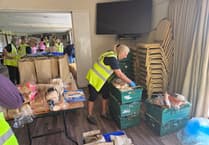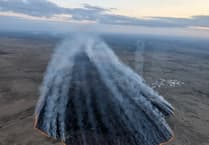Following the recent Met Office yellow weather warning for the South West, the British Red Cross is offering advice on how to prepare in case of flooding or damage caused by heavy rain or high winds.
With persistent heavy rain forecast for much of the region from 9pm on Wednesday, January 11 until 5pm on Thursday, January 12, the British Red Cross has its emergency response teams on standby across the South West in case they are needed. The charity has also issued some helpful tips to the public on how to prepare.
Chris Davies, head of crisis response at the British Red Cross said:
“We know from experience that emergency situations like flooding or damage to property after bad weather can be stressful, dangerous and upsetting. But weather warnings can be helpful because they can help you prepare for the unexpected, especially if you live in an area that is predicted to be affected.
“There are a few practical steps you can take to help you prepare before, during and after bad weather. It’s practical things like making sure your mobile phone is fully changed and that you have torches. Also having an emergency kit handy with all your important documents and contacts. And making sure to check in with family, friends and neighbours to see that they are safe and well.
“In the meantime, the British Red Cross emergency response team is on standby to help, should anything happen and should our support be needed.”
How to prepare for bad weather
Check online for weather updates
Find out who your gas suppliers are and unplug essential electrical appliances
Close and seal doors and windows
Secure loose objects that could be blown away and cause damage
Prepare an emergency kit, including a torch, mobile phone charger and a list of emergency contact numbers
Park vehicles in a garage or clear from buildings, trees, walls and fences
How to stay safe during bad weather
Shut all windows, close doors and keep away from windows
Stay inside until the storm has passed
Avoid using the phone, and even taps and sinks – telephone lines and metal pipes can conduct electricity
If you’re out, seek shelter in a substantial building or vehicle. Don’t stand under trees.
Don’t drive unless your journey is really necessary but if you are driving, slow down or stop and park somewhere away from trees and overhead power lines
What to do after bad weather
Once a thunderstorm has passed, take care not to touch any electrical or telephone cables that have been blown down
Don’t walk too close to walls, building and trees as they have been weakened
Check in on any vulnerable neighbours or relatives
More information on how to prepare for disasters and emergencies, and how to prepare an emergency kit can be found at redcross.org.uk.





Comments
This article has no comments yet. Be the first to leave a comment.